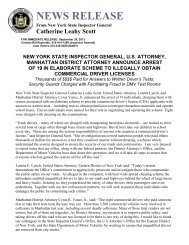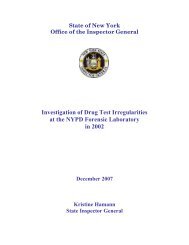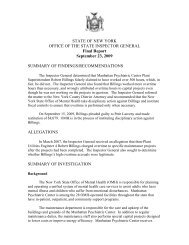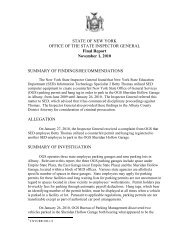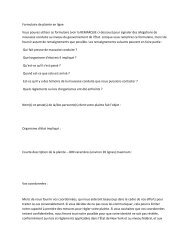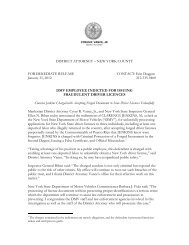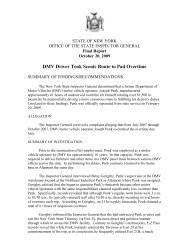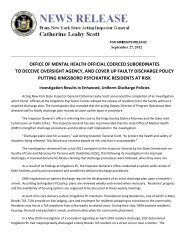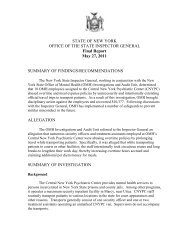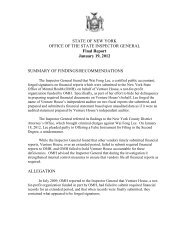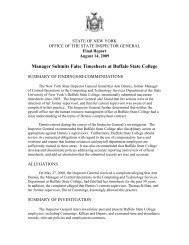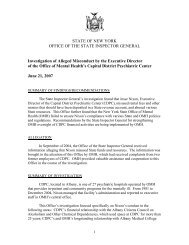State Liquor Authority Chair's Claim of Undue Influence Is ...
State Liquor Authority Chair's Claim of Undue Influence Is ...
State Liquor Authority Chair's Claim of Undue Influence Is ...
You also want an ePaper? Increase the reach of your titles
YUMPU automatically turns print PDFs into web optimized ePapers that Google loves.
STATE OF NEW YORK<br />
OFFICE OF THE STATE INSPECTOR GENERAL<br />
Final Report<br />
February 21, 2009<br />
STATE LIQUOR AUTHORITY CHAIR’S CLAIM OF UNDUE INFLUENCE<br />
IS UNFOUNDED, INSPECTOR GENERAL CONCLUDES<br />
SUMMARY OF FINDINGS/RECOMMENDATIONS<br />
The Inspector General investigated allegations that Carl Andrews, then a Deputy<br />
Secretary to the Governor, exerted improper political influence on Daniel Boyle, the<br />
Chairman <strong>of</strong> the <strong>State</strong> <strong>Liquor</strong> <strong>Authority</strong>, 1 during the pendency <strong>of</strong> proceedings involving<br />
Cipriani family establishments’ liquor licenses. The Inspector General’s investigation<br />
found the allegations to be unsubstantiated. The Inspector General found, however, that<br />
Khari Edwards, a subordinate to Andrews, improperly contacted <strong>State</strong> <strong>Liquor</strong> <strong>Authority</strong><br />
Commissioner Jeanique Greene in the midst <strong>of</strong> a board meeting to discuss the Cipriani<br />
matters pending before the board that day. Moreover, Edwards did not testify truthfully<br />
to the Inspector General when questioned under oath regarding this communication. The<br />
Inspector General finds that Edwards is ill-suited to serve as a representative <strong>of</strong> the<br />
Governor’s <strong>of</strong>fice, and recommends that his employment be terminated.<br />
ALLEGATIONS<br />
On Friday, November 21, 2008, <strong>State</strong> <strong>Liquor</strong> <strong>Authority</strong> Chairman Daniel Boyle<br />
telephoned the First Deputy Inspector General to advise that a formal complaint to the<br />
Inspector General would be forthcoming. Boyle made no direct references to the Cipriani<br />
proceedings during the call, but expressed general frustration with the <strong>Authority</strong>, and<br />
stated that he would be forwarding materials to the Inspector General’s <strong>of</strong>fice which<br />
would outline his concerns.<br />
The following Monday, November 24, 2008, the New York Post reported that<br />
Boyle had alleged that then-Deputy Secretary to the Governor for Intergovernmental<br />
Affairs Carl Andrews had exerted undue political pressure upon him during the<br />
<strong>Authority</strong>’s disciplinary proceedings against a number <strong>of</strong> Cipriani-owned restaurants<br />
holding state liquor licenses. 2 In the article, Boyle alleged that, in a meeting six months<br />
1 Daniel Boyle’s term as Chairman <strong>of</strong> the <strong>Authority</strong> formally expired on February 13, 2009. Pursuant to<br />
New York <strong>State</strong>’s Alcoholic Beverage Control Law, he will remain in his position until a successor is<br />
“appointed and qualified.” N.Y. Alco. Bev. Cont. § 11 (McKinney 1995).<br />
2 Frederic U. Dicker, Cipriani Muscle Entree, N.Y. Post, November 24, 2008, at 9.<br />
1
earlier in May 2008, Andrews had pressured him to allow the Cipriani entities to retain<br />
their licenses after the Ciprianis had been convicted <strong>of</strong> income tax evasion. The Post also<br />
reported <strong>Authority</strong> Counsel Thomas Donohue’s impression that the Ciprianis’ counsel<br />
somehow knew how newly-appointed commissioner Jeanique Greene would vote on the<br />
relevant licensing matters on the day <strong>of</strong> the <strong>Authority</strong>’s vote.<br />
Upon reading the Post story that morning, the First Deputy Inspector General<br />
telephoned Boyle to inform him that the Inspector General would be undertaking an<br />
investigation into the matter, and requested that he send the materials he referenced<br />
during their previous telephone discussion. A few minutes later, Boyle faxed to the<br />
Inspector General a ten-page typed chronology <strong>of</strong> events beginning in April 2008. The<br />
notes described Boyle’s concerns, covered some <strong>of</strong> the allegations that had appeared in<br />
the Post, and also implied that his vote to revoke the Ciprianis’ liquor licenses had<br />
resulted in retaliation against him.<br />
Later, during his first examination by the Inspector General’s <strong>of</strong>fice, Boyle<br />
articulated his concerns in greater detail. 3 He claimed that Commissioner Greene and<br />
Commissioner Noreen Healey deprived him <strong>of</strong> certain administrative authority<br />
previously delegated to him by board resolution, and that he was forced to accept certain<br />
staff changes imposed upon him by the other Commissioners and members <strong>of</strong> the<br />
Governor’s executive staff. Boyle also implied that he was forced by the Governor’s<br />
<strong>of</strong>fice to provide Healey and Greene with state automobiles for their use as a reward for<br />
their votes. 4<br />
SUMMARY OF INVESTIGATION<br />
The Inspector General reviewed relevant documents including the <strong>Authority</strong>’s<br />
application file, documents maintained by the <strong>Authority</strong>’s Chairman, Commissioners, and<br />
staff, and telephone records. The Inspector General examined members <strong>of</strong> the <strong>Authority</strong>,<br />
including Chairman Boyle, Commissioners Healey and Greene, Counsel Thomas<br />
Donohue, and Deputy Commissioner <strong>of</strong> Governmental Affairs Thomas O’Connor. The<br />
Inspector General also examined members <strong>of</strong> the Governor’s staff, including Carl<br />
Andrews, the then-Deputy Secretary for Intergovernmental Affairs; Khari Edwards, a<br />
Regional Representative for Intergovernmental Affairs; and Sylvia Hamer, Deputy<br />
Secretary for Technology Operations and Gaming. In addition, the Inspector General<br />
examined the Ciprianis’ regulatory attorneys, Warren Pesetsky and Robert Bookman. All<br />
such examinations were conducted under oath and recorded.<br />
3 Chairman Boyle was examined by the Inspector General’s <strong>of</strong>fice on December 8, 2008, and January 22,<br />
2009.<br />
4 See also, Susan Edelman, Cipriani Saviors Get Cars, N.Y. Post, November 30, 2008, at 4 (suggesting that<br />
Commissioners Healey and Greene had received the use <strong>of</strong> state cars as “a perk”).<br />
2
The <strong>State</strong> <strong>Liquor</strong> <strong>Authority</strong>’s License Revocation Process and the Cipriani Licensees<br />
The New York <strong>State</strong> Division <strong>of</strong> Alcoholic Beverage Control exists within the<br />
state’s executive department. 5 The Division is headed by the three-member <strong>State</strong> <strong>Liquor</strong><br />
<strong>Authority</strong>, which consists <strong>of</strong> a chairperson and two commissioners appointed by the<br />
Governor with the advice and consent <strong>of</strong> the state Senate. The <strong>Authority</strong> has the power<br />
to appoint deputies and other staff. For administrative and other purposes, the members<br />
<strong>of</strong> the <strong>Authority</strong> report to the Deputy Secretary for Technology Operations and Gaming<br />
within the Governor’s <strong>of</strong>fice.<br />
The <strong>State</strong> <strong>Liquor</strong> <strong>Authority</strong> issues liquor licenses to restaurants, bars, and other<br />
entities, and ensures compliance with New York <strong>State</strong>’s Alcoholic Beverage Control<br />
Law. In the event that the holder <strong>of</strong> a liquor license is convicted <strong>of</strong> a felony, the<br />
<strong>Authority</strong> must revoke the license unless the felon receives a certificate <strong>of</strong> relief from<br />
disabilities – a legal means <strong>of</strong> avoiding collateral civil consequences to a felony<br />
conviction. 6 Such certificate does not prevent the <strong>Authority</strong> from exercising its<br />
discretionary power to revoke a liquor license.<br />
In July 2007, Arrigo Cipriani and his son, Giuseppe Cipriani, who together had<br />
operated multiple establishments holding liquor licenses in New York City, were<br />
convicted by guilty plea <strong>of</strong> various charges <strong>of</strong> tax evasion. Arrigo Cipriani was convicted<br />
<strong>of</strong> a felony charge, and Giuseppe Cipriani, the principal listed on the Cipriani entities’<br />
licenses, was convicted <strong>of</strong> a misdemeanor charge. As a condition <strong>of</strong> their plea<br />
agreements, the Ciprianis agreed to pay $10 million in unpaid taxes and engaged an<br />
independent monitor <strong>of</strong> their family businesses’ taxes. Arrigo and Giuseppe Cipriani<br />
each received a certificate <strong>of</strong> relief from disabilities from the court on the day <strong>of</strong><br />
sentencing, October 10, 2007.<br />
In early spring 2008, the <strong>State</strong> <strong>Liquor</strong> <strong>Authority</strong> filed a series <strong>of</strong> charges against<br />
nine Cipriani entities by Notice <strong>of</strong> Pleading. Each Notice cited multiple infractions <strong>of</strong> the<br />
Alcoholic Beverage Control Law. These included availing (the use <strong>of</strong> a liquor license by<br />
a person other than the named license holder) 7 and “conduct . . . <strong>of</strong> improper nature” –<br />
tax<br />
5 The executive department is an administrative division <strong>of</strong> the executive branch <strong>of</strong> state government that,<br />
by statute, is headed by the Governor.<br />
6 See also, <strong>Liquor</strong>gate Anyone? N.Y. Post, November 26, 2008, at 32 (questioning whether the two<br />
commissioners’ votes not to revoke were improper because, “[t]ypically, a felony conviction would<br />
automatically bar someone from holding a liquor license.”).<br />
7 Each <strong>of</strong> the nine establishments registered to Giuseppe Cipriani was charged with allowing other Cipriani<br />
corporate entities and Giuseppe’s father, Arrigo, and sisters, Carmela and Giovanna, to use the<br />
establishment’s liquor license.<br />
3
evasion. After months <strong>of</strong> discussions, 8 the <strong>Authority</strong>’s counsel and the Ciprianis’<br />
counsel negotiated a possible settlement <strong>of</strong>fer, pursuant to which the Cipriani licensees<br />
would pay a $500,000 fine, 9 but their licenses would not be suspended. Donohue<br />
testified that he approached both Chairman Boyle and Commissioner Healey about the<br />
settlement <strong>of</strong>fer to determine whether he should continue to pursue such negotiations.<br />
Both advised him that they were receptive to a possible settlement.<br />
May 6, 2008, Meeting Between Chairman Boyle and Deputy Secretary Andrews<br />
According to Chairman Boyle’s testimony to the Inspector General, he received a<br />
call in April 2008 from <strong>State</strong> Senator Hugh Farley seeking information about the<br />
licensure <strong>of</strong> Lola Restaurant in New York City. 10 When Boyle later met with Farley on<br />
May 5, 2008, to provide the information, Farley asked Boyle to meet with Carl Andrews<br />
and provide the information to him directly. Boyle, who testified that he did not know<br />
Andrews at that time, agreed to meet Andrews the next day. 11 As the Governor’s Deputy<br />
Secretary for Intergovernmental Affairs, Andrews served as a community liaison for the<br />
Governor and his state agencies and supervised a small staff <strong>of</strong> regional representatives.<br />
According to Boyle and Andrews, they met privately in Andrews’ <strong>of</strong>fice in the<br />
Capitol in Albany on May 6, 2008. Both parties testified that the meeting primarily<br />
focused on community issues regarding Lola Restaurant and its pending court case. The<br />
conversation then turned to administrative issues at the <strong>Authority</strong>, including the recent<br />
resignation <strong>of</strong> the chief executive <strong>of</strong>ficer and the change in supervising Deputy Secretary<br />
from Laura LeFay to Sylvia Hamer.<br />
Boyle informed the Inspector General that, toward the end <strong>of</strong> the meeting,<br />
Andrews asked him about the Cipriani matters. According to Boyle, he had not been<br />
debriefed on the Cipriani issues and was not fully prepared to discuss them, but told<br />
8 The <strong>Authority</strong>’s counsel, assisted by <strong>Authority</strong> staff, negotiated a potential settlement <strong>of</strong> the charges with<br />
the Cipriani licensees. Specifically, the Cipriani licensees sought, through a mechanism known as a<br />
conditional no contest <strong>of</strong>fer, to submit an <strong>of</strong>fer to the <strong>Authority</strong> for final determination. If the <strong>of</strong>fer were<br />
rejected by the members <strong>of</strong> the <strong>Authority</strong>’s board, the matter would be returned to the <strong>Authority</strong>’s counsel’s<br />
<strong>of</strong>fice to schedule an administrative hearing <strong>of</strong> the charges. The <strong>Authority</strong>’s counsel initially raised the<br />
possibility <strong>of</strong> a combination <strong>of</strong> a license suspension (meaning that the entities could not maintain operations<br />
serving alcohol during the pendency <strong>of</strong> the suspension) and the maximum $10,000 penalty for each <strong>of</strong> 36<br />
charges – a $360,000 fine. The Ciprianis rejected that option, arguing that for business reasons their<br />
catering and related businesses could not accept a suspension.<br />
9 Because the <strong>Authority</strong> only has jurisdiction to fine $10,000 per charge, in order to attain the $500,000<br />
fine, additional charges were added that had not originally been filed. <strong>Authority</strong> Counsel Donohue testified<br />
that these additional 14 charges could have originally been filed, but were not.<br />
10<br />
Lola Restaurant, in the SoHo section <strong>of</strong> Manhattan, sought permission from the <strong>Authority</strong> under its liquor<br />
license to play live music. The subject <strong>of</strong> Lola’s license generated a great deal <strong>of</strong> community interest and<br />
prompted a lawsuit by a neighborhood association, the SoHo Alliance. The dispute over Lola’s license<br />
arose during former Governor Spitzer’s administration and, by all accounts, was the subject <strong>of</strong> a fair<br />
amount <strong>of</strong> discussion between the Governor’s <strong>of</strong>fice and the <strong>Authority</strong> over the course <strong>of</strong> many months.<br />
11 While Boyle testified that he did not recall ever speaking to Andrews before May 6, 2008, a number <strong>of</strong><br />
witnesses testified that, in the summer <strong>of</strong> 2007, Boyle had attended a meeting via teleconference between<br />
members <strong>of</strong> the <strong>Authority</strong>’s staff and Andrews and his staff.<br />
4
Andrews that it was an important case “that we need to take a look at . . . .” He testified<br />
that he told Andrews:<br />
[O]ur lawyers are working on it with their lawyers, maybe<br />
to come up with some kind <strong>of</strong> resolution to it, which is the<br />
normal course <strong>of</strong> business. I told Carl Andrews at that time<br />
also not to get involved, nor should the Governor, because<br />
no matter what, this could be a very sticky case . . . . I<br />
stated, also, that we shouldn’t just take a fine for a situation<br />
like this, because we don’t – it’s not consistent with what<br />
we do.<br />
Boyle further stated that he informed Andrews that the Ciprianis were charged<br />
with availing, which “usually [results in] a loss <strong>of</strong> the license.” Boyle testified that<br />
Andrews asked, “Can I <strong>of</strong>fer you some political advice?” and he responded, “Go ahead.”<br />
According to Boyle, Andrews then said, “With your meeting, speak how you feel, but do<br />
what you’re supposed to do, keeping in mind you work for us[,]” implying, according to<br />
Boyle, that the Governor’s Office wanted the Ciprianis to retain their licenses. Boyle<br />
testified that Andrews’ statement led him to believe that “there was a problem” in that<br />
Andrews wanted him “to vote a certain way.” Boyle testified that he “stood up, and that<br />
was the end <strong>of</strong> the conversation.” Boyle testified that he returned to his <strong>of</strong>fice and made<br />
notes <strong>of</strong> the event. 12 He told no one other than his secretary about the meeting.<br />
By contrast, Andrews testified that he simply asked Boyle about the status <strong>of</strong> the<br />
Cipriani licensees towards the end <strong>of</strong> the meeting. His question was “[o]ut <strong>of</strong> interest.<br />
Just passing in conversation. I said, ‘I’m not trying to tell you how to vote, just give me<br />
your thoughts on it.’ Because it had been in the papers and I knew a pending vote was<br />
coming. I didn’t know when.” Andrews said he vaguely recalled discussing with Boyle<br />
the possibility <strong>of</strong> the licensees paying a fine, and that he mentioned that “a lot <strong>of</strong> people<br />
work there.” Andrews testified that no one had directed him to ask about the Cipriani<br />
entities, and that he had never spoken to any representative <strong>of</strong> the Cipriani licensees. He<br />
also testified that he “had no opinion” about the Cipriani proceedings. Andrews noted<br />
that, from his knowledge <strong>of</strong> the <strong>Authority</strong> and Commissioner Boyle’s reputation in the<br />
Governor’s <strong>of</strong>fice, “it was perceived that he was very difficult to work with, deputy<br />
secretaries had problems working with him.” He denied having told Boyle “remember<br />
who you work for,” but might have said, as a general statement, something along the<br />
lines <strong>of</strong>, “We all work together. I’m trying to help you work with the agencies.” He<br />
testified that he found the Chairman’s intimidation claim “puzzling” because Boyle<br />
called him subsequently about unrelated issues: “[If] he felt uncomfortable, why continue<br />
to talk to me?” Andrews recalled shaking hands at the end <strong>of</strong> the meeting. “He went his<br />
way. I went back to my work.”<br />
12 In his notes, Boyle wrote a substantially similar account to his testimony before the Inspector General:<br />
“Andrews then said, can I <strong>of</strong>fer you some sound political advise [sic] – go ahead for your meeting, speak<br />
how you feel but vote on what you need to do. ‘You can save face for yourself by how you feel but people<br />
here are who you answer to.’”<br />
5
Later that day, the Governor’s press <strong>of</strong>fice called Chairman Boyle’s <strong>of</strong>fice to<br />
relay a media inquiry as to whether Andrews had called the <strong>Authority</strong> to advocate on<br />
behalf <strong>of</strong> the Ciprianis. Deputy Commissioner O’Connor inquired <strong>of</strong> Chairman Boyle<br />
and Counsel Donohue whether contact had been made by Andrews regarding the<br />
Ciprianis. According to O’Connor, both Donohue and Boyle said that they had not been<br />
contacted. According to O’Connor, at Boyle’s instruction, he responded later that day to<br />
the Governor’s press <strong>of</strong>fice that, as far as he was aware, the only contact that had been<br />
made by the Governor’s <strong>of</strong>fice regarding the Ciprianis was an informational inquiry from<br />
a regional representative responsible for <strong>State</strong> <strong>Liquor</strong> <strong>Authority</strong> matters, Khari Edwards,<br />
and that Edwards had not advocated one position or another. By contrast, Boyle testified<br />
that he “didn’t respond” to O’Connor’s question. He continued, “I didn’t know – first <strong>of</strong><br />
all, I didn’t want to put any <strong>of</strong> my staff people in a position, and I didn’t know where this<br />
was going to go.”<br />
According to Andrews, Boyle called him on the afternoon <strong>of</strong> their meeting to say<br />
that a newspaper had called him and knew that the two had met, and that the newspaper<br />
wanted to know if the meeting was about the Ciprianis. Andrews informed the Inspector<br />
General that he had no idea how the newspaper had learned <strong>of</strong> the meeting, and that he<br />
had told Boyle, in essence, “You know we talked, and Cipriani’s wasn’t our main topic. I<br />
just asked you a passing question about Cipriani’s.” Andrews stated that he never spoke<br />
to Boyle again about the Cipriani licensees; that he did not know how the newspaper<br />
learned <strong>of</strong> their meeting; and that he did not contact the newspaper reporter on or about<br />
May 6, 2008. Boyle testified that he did not recall calling Andrews, and did not believe<br />
that he had done so. Had he done so, he averred, he would likely have memorialized<br />
such a conversation, and he did not.<br />
Boyle testified that a related incident involving the Ciprianis’ counsel also made<br />
him suspicious. He learned from <strong>Authority</strong> Counsel Donohue that Donohue had received<br />
telephone calls from attorneys Warren Pesetsky and Robert Bookman in the spring <strong>of</strong><br />
2008 asking if someone from the Governor’s Office had called him yet to negotiate a<br />
lower <strong>of</strong>fer. 13 On May 6, 2008, Donohue asked the <strong>Authority</strong>’s then-CEO Joshua Toas,<br />
Deputy Commissioner O’Connor, and Chairman Boyle if they had received any such<br />
calls. All said they had not. When asked about Donohue’s allegation that Pesetsky had<br />
called him, Pesetsky testified that he did not recall ever having made such a call.<br />
Bookman also denied having made such a call to Donohue, but admitted that he had<br />
complained to Edwards about the size <strong>of</strong> the fine. Edwards and Bookman both testified<br />
that the two were acquainted and had prior business dealings, as Bookman was the<br />
President <strong>of</strong> the New York City Nightlife Association and had many matters pending<br />
before the <strong>Authority</strong>. Ultimately, by all accounts, no one from the Governor’s Office<br />
ever called the <strong>Authority</strong> to negotiate a lower fine for the Ciprianis.<br />
13 Donohue informed the Inspector General that the Ciprianis’ counsel said, in substance, “they’re gonna<br />
ask for it [the settlement amount] to be lowered” from $500,000 to $400,000.<br />
6
The May 28, 2008, Board Meeting<br />
A <strong>State</strong> <strong>Liquor</strong> <strong>Authority</strong> board meeting was scheduled for May 28, 2008, to<br />
address many issues before the <strong>Authority</strong>, including the Cipriani matters. At the time, the<br />
board consisted <strong>of</strong> only two members, Chairman Boyle and Commissioner Healey,<br />
because a commissioner had retired and had not yet been replaced. Following normal<br />
practice, a few days before the meeting, Boyle and Healey each received a package <strong>of</strong><br />
information from Donohue concerning the matters on the agenda, including the Cipriani<br />
matters.<br />
Boyle testified that Andrews again tried to pressure him just before the May 28,<br />
2008, board meeting. According to Boyle, on May 27 at approximately 10:45 a.m., he<br />
received a telephone call from Andrews. When they spoke, Andrews asked how his<br />
weekend was. 14 Boyle testified that when he answered Andrews’ question, and asked<br />
how he could help Andrews, Andrews replied that he was simply calling to ask about<br />
Boyle’s weekend. Boyle testified that he interpreted this call to be a reminder from<br />
Andrews how he was expected to vote on the Cipriani matters. For his part, Andrews<br />
testified that he did not recall ever making such a call: “I don’t know why I would just<br />
call out <strong>of</strong> the blue and say how was your weekend. There has to be something else in<br />
the conversation other than just how was your weekend.”<br />
In her testimony to the Inspector General, Healey said that she had no discussions<br />
with the Governor’s Office or anyone other than Counsel Donohue regarding the Cipriani<br />
liquor license issues prior to that board meeting. 15 Healey testified that she did not speak<br />
to the Chairman and did not know how he was going to vote on the matter. She testified<br />
that Boyle never informed her that Deputy Secretary Andrews or anyone on behalf <strong>of</strong> the<br />
Governor’s Office had contacted him regarding the Cipriani matter.<br />
At the May 28 meeting, Boyle voted not to accept the <strong>of</strong>fer and Healey voted to<br />
accept the <strong>of</strong>fer. As a result, the Cipriani licensees’ <strong>of</strong>fer was rejected and the Ciprianis<br />
sought reconsideration <strong>of</strong> the issue by the <strong>Authority</strong>. 16 The Cipriani licensees’ request<br />
for reconsideration and the settlement <strong>of</strong>fer were ultimately scheduled to be heard again<br />
by the board at a meeting on August 6, 2008.<br />
14 In his notes, Boyle wrote that Andrews called, and he called Andrews back: “5/27/08 – Tuesday morning<br />
approx. 10:45, I received a call from Carl Andrews – I returned the call . . . , he just wanted to ask how my<br />
weekend was.” The Inspector General reviewed Chairman Boyle’s cell phone records for May 27, 2008,<br />
which indicate that a call was placed at 10:00 a.m. to Carl Andrews’ telephone number at the Governor’s<br />
<strong>of</strong>fice in Albany, and that such telephone call lasted two minutes.<br />
15 In fact, Healey testified that she did not meet Andrews until July 2008, when the two met briefly, but did<br />
not discuss the Cipriani matters.<br />
16 As a result <strong>of</strong> the tie vote, procedure dictated that an Administrative Law Judge hear the charges as to<br />
whether the Cipriani licenses would be revoked. According to Cipriani attorney Warren Pesetsky, the<br />
Cipriani licensees requested that such a hearing be scheduled far enough in the future that the matter could<br />
be reconsidered by the Board first, in the hope and expectation that a new commissioner would be<br />
appointed who would break the tie vote in the Ciprianis’ favor.<br />
7
The June 2008 Appointment <strong>of</strong> Commissioner Greene<br />
Within weeks <strong>of</strong> the May board meeting, on June 23, 2008, Jeanique Greene was<br />
confirmed as a commissioner <strong>of</strong> the <strong>Authority</strong>. 17 Greene informed the Inspector General<br />
that in June 2008 she met with personnel in the Governor’s <strong>of</strong>fice to learn the background<br />
<strong>of</strong> the <strong>Authority</strong> and Commissioners’ roles. She testified that, at no time during the<br />
period leading up to her appointment, did anyone raise any specific matters regarding the<br />
Cipriani licensees or any other licensees; only general issues were discussed. She had no<br />
knowledge <strong>of</strong> any specific pending <strong>Authority</strong> issues, including the Cipriani licensees’<br />
issues, until she commenced work there on July 21, 2008. She first heard about the<br />
Cipriani matters during her first week <strong>of</strong> work through Counsel Donohue who explained<br />
the Cipriani issues and its procedural history. Greene recalled that Donohue provided her<br />
with a “board package,” including material on the Cipriani matters, at the end <strong>of</strong> July<br />
2008. Donohue testified that Greene did not appear to have prior knowledge <strong>of</strong> the<br />
matter.<br />
Greene testified that she met separately with both Boyle and Healey after<br />
receiving the written materials on the Cipriani matters, but before the August 6, 2008,<br />
board meeting. Her meeting with Boyle was approximately one or two days before the<br />
August 6 board meeting. Boyle told her <strong>of</strong> his previous vote and said that it was his<br />
belief that the Ciprianis should not have a liquor license. According to Greene, Boyle did<br />
not inform her that anyone had contacted him regarding his vote on the Cipriani matter,<br />
or that political pressure was being exerted upon him. Greene testified that she did not<br />
tell Boyle how she expected to vote, and Boyle told her that he did not wish to know and<br />
that she did not have to discuss that with anyone.<br />
Greene informed the Inspector General that she met with Healey prior to the<br />
August board meeting. Their discussion was mostly general in nature, pertaining to<br />
routine board matters and the structure <strong>of</strong> board meetings. Greene stated that she did not<br />
recall Healey telling her about her previous vote on the Cipriani matters, or how she was<br />
prepared to vote at the upcoming meeting. Greene did recall that Healey said something<br />
about everyone having their own vote, and that Greene did not have to tell Healey how<br />
she expected to vote. According to Greene, Healey did not say that she felt any pressure<br />
to vote a certain way on the Cipriani matter, or that she was ever contacted by anyone<br />
from the Governor’s <strong>of</strong>fice or by any politician concerning the Cipriani matter.<br />
According to Greene, approximately a day or two before the August 6, 2008,<br />
board meeting, she called Sylvia Hamer, the Deputy Secretary to the Governor whose<br />
portfolio included the <strong>Authority</strong>. Greene stated that she had first met Hamer on June 23,<br />
2008, the day she was confirmed as Commissioner, but had not discussed the Cipriani<br />
matter. Greene called Hamer to discuss material in the Cipriani board package,<br />
specifically to ask whether it was true, as a labor union had asserted, that the tax impact<br />
to the state would be pr<strong>of</strong>ound if the Cipriani entities’ licenses were revoked. According<br />
to Greene, Hamer said that it would impact the state, particularly with respect to the loss<br />
<strong>of</strong> taxes, but she spoke generally. Greene testified that she and Hamer never discussed<br />
17 On that same day, Commissioner Healey was reappointed for a second term.<br />
8
Greene’s vote. Greene testified that, based upon her conversation with Hamer, she did<br />
not feel that that Governor’s <strong>of</strong>fice preferred a particular outcome in the Cipriani matters,<br />
and at the conclusion <strong>of</strong> that conversation, she “absolutely” felt that she could vote<br />
independently.<br />
Chairman Boyle and Commissioner Healey testified that because Commissioner<br />
Greene had just joined the <strong>Authority</strong>, they did not know whether she was going to vote<br />
on any matters at the August 6, 2008, meeting. According to <strong>Authority</strong> Counsel<br />
Donohue, on the morning <strong>of</strong> August 6, during a discussion prior to the commencement <strong>of</strong><br />
the board meeting, Cipriani counsel Pesetsky told Donohue that Greene was going to vote<br />
on the Cipriani matter. Donohue told the Inspector General that he responded, “Well, it’s<br />
news to me,” and that it was his “impression” that Pesetsky knew how Greene would<br />
vote. While Donohue indicated that he took “anything [Pesetsky] says with a grain <strong>of</strong><br />
salt,” he nevertheless described his interaction with Pesetsky to the Chairman. Pesetsky<br />
informed the Inspector General that he never told Donohue that Greene was going to<br />
vote, or how should would vote. Rather, he believed that it was Donohue who had told<br />
him that Commissioner Greene was going to vote, not the other way around. According<br />
to Pesetsky, “if anyone told anyone that she was prepared to vote on that matter on that<br />
day, it would have been Mr. Donohue telling me. I would have had no way <strong>of</strong> knowing<br />
that.” Greene herself informed the Inspector General that she had told Donohue that she<br />
was prepared to vote on the Cipriani matters, but did not tell him how she expected to<br />
vote. She testified that she did not know Pesetsky and did not meet him until the August<br />
6 meeting.<br />
In his testimony before the Inspector General, Boyle suggested that Greene’s<br />
decision to vote on the Cipriani matters was indicative <strong>of</strong> some outside influence because<br />
she did not vote on all matters on the agenda that day. <strong>Authority</strong> records, however,<br />
reflect that Greene voted on 207 <strong>of</strong> 254 matters before the <strong>Authority</strong> – more than 80<br />
percent – including six <strong>of</strong> nine licensing matters and 191 <strong>of</strong> 235 disciplinary matters.<br />
That Greene abstained from some votes is not surprising, considering the fact that she<br />
commenced work at the <strong>Authority</strong> only weeks before.<br />
The Board Votes on the Cipriani Matters<br />
At the August 6, 2008, meeting, which was digitally recorded and posted to the<br />
<strong>Authority</strong>’s Web site, the board voted unanimously to reconsider the Cipriani matters.<br />
Counsel Pesetsky made a brief statement on behalf <strong>of</strong> the Ciprianis. Chairman Boyle<br />
asked if the other commissioners had any questions, and they did not. Commissioner<br />
Healey then made a statement on the record noting that the Ciprianis had pleaded guilty,<br />
and had agreed to a “substantial” settlement <strong>of</strong>fer to the <strong>Authority</strong> and to retain a tax<br />
auditor in the future. She also noted her concern about the effect that the revocation <strong>of</strong><br />
the Cipriani licenses would have on tax receipts, those employed by the Ciprianis, and<br />
clients who had scheduled events at Cipriani restaurants. Later, in her examination by the<br />
Inspector General, Healey testified that she was also concerned that a revocation would<br />
be overturned on appeal.<br />
9
Chairman Boyle also stated his concerns on the record. He noted his belief that<br />
the underlying tax crime and charges <strong>of</strong> availing were serious, and that it would be<br />
improper “for us to sit here as a board and disregard these kinds <strong>of</strong> charges – it’s<br />
unbelievable.” He also expressed concern that the Ciprianis were “buy[ing] their way<br />
through the system.” Finally, he asserted his belief that another entity would take over<br />
the restaurants and reemploy those who had been Cipriani employees.<br />
Commissioner Greene then spoke, noting that she had considered “how serious<br />
the charge is,” but also that the Ciprianis were “trying to make concessions, trying to<br />
make things right.” She acknowledged that she did not have the “history <strong>of</strong> other<br />
applicants who have come forward in similar situations [and could] only judge what is<br />
right in front <strong>of</strong> [her] . . . .” She also noted her concern about the impact <strong>of</strong> revocation<br />
upon the Cipriani employees.<br />
For each <strong>of</strong> the nine Cipriani licensees, after the board granted reconsideration <strong>of</strong><br />
the respective matter, Commissioners Healey and Greene voted to accept the settlement<br />
<strong>of</strong>fer and Chairman Boyle voted against doing so. As Healey and Greene formed a<br />
majority, the <strong>of</strong>fers totaling $500,000 were accepted and the licensees were permitted to<br />
retain their respective liquor licenses.<br />
Regional Representative Edwards Contacts Commissioner Greene<br />
During the August 6, 2008, board meeting at which the Cipriani settlement was<br />
accepted by the board, a Regional Representative for Intergovernmental Affairs from<br />
Carl Andrews’ staff, Khari Edwards, contacted <strong>Authority</strong> Deputy Commissioner for<br />
Intergovernmental Affairs Thomas O’Connor.<br />
While O’Connor was Edwards’ usual contact at the <strong>Authority</strong>, Edwards made the<br />
unusual request to speak to Commissioner Greene directly. Specifically, at 10:04 a.m.,<br />
Edwards sent an e-mail to O’Connor asking, “Hey Tom what time does the full board<br />
meet today? I need to speak to Commissioner Green ASaP [sic].” At the time, the board<br />
was in session but had not yet voted on the Cipriani matters. O’Connor testified that he<br />
did not ask why Edwards was calling, nor did he inform Edwards that Greene was in a<br />
meeting. Rather, upon receipt <strong>of</strong> Edwards’ e-mail, he wrote a message to Commissioner<br />
Greene that Khari Edwards from the Governor’s <strong>of</strong>fice had called and wanted to talk to<br />
her as soon as possible. The message was delivered to Greene while the meeting was in<br />
progress.<br />
Greene informed the Inspector General that when she read the note directing her<br />
to call Edwards, she had no idea what the call was about. She stated that she was anxious<br />
because she was appearing for the first time in a Webcast, and initially thought that the<br />
Governor’s <strong>of</strong>fice might be calling to comment on her screen appearance. She said she<br />
did not know Edwards, and had never heard his name. After a few minutes, she asked to<br />
take a break, and called him. She recalled to the Inspector General that Edwards had said<br />
he was calling to ask about the Ciprianis or to relay a message regarding the Ciprianis.<br />
Greene replied that she could not discuss anything with him. Edwards said, “OK,” and<br />
10
the conversation ended. Greene informed the Inspector General that she did not know on<br />
whose behalf Edwards had called, was furious to have received such a call, and once she<br />
learned that the call related to the Ciprianis, she knew it was inappropriate. Greene told<br />
the Inspector General that the phone call did not affect her vote in any way. The only<br />
effect it had was that it annoyed her because it had interrupted the board meeting, and<br />
embarrassed her in front <strong>of</strong> the board. Shortly after the board meeting, Greene contacted<br />
Deputy Secretary Hamer to complain about Edwards’ call, and to request that no one<br />
from the Governor’s <strong>of</strong>fice call her except Hamer herself. According to Greene, Hamer<br />
agreed. Hamer testified that she remembered receiving a call from Greene about the call<br />
from Edwards, and that Greene was upset. Hamer also testified that, at the time, she did<br />
not know Edwards or why he called.<br />
At 10:47 a.m., O’Connor e-mailed Edwards, “I sent a note into Commissioner<br />
Greene to call you on your cell ASAP.” At 11:00 a.m., Edwards responded, “Can you<br />
call me too[?]” According to O’Connor, when he called, Edwards told him, in essence,<br />
that he had told Greene that “they didn’t care if it was revoked or not, but if it wasn’t<br />
revoked, they wanted to see . . . a substantial or a high penalty.” In his testimony to the<br />
Inspector General, Edwards claimed that he did not recall making such a statement to<br />
O’Connor.<br />
Edwards’ Multiple Explanations for His Actions<br />
The Inspector General interviewed Edwards under oath on multiple occasions,<br />
during which Edwards provided a series <strong>of</strong> inconsistent explanations as to why he had<br />
asked to speak to Commissioner Greene, and about what he said to her when she<br />
telephoned him. He first told the Inspector General that he did not even know who<br />
Greene was or that a board meeting was in progress; and that he was simply trying to<br />
learn the result <strong>of</strong> the board’s vote on the Cipriani licensees.<br />
Carl Andrews testified that Edwards told him he had accidentally called Greene:<br />
“He said, “I called over there to find out what's going on. I think they put the<br />
commissioner on the line or something.” Andrews also testified, “I believe he said he<br />
called, he wanted to find out how the Cipriani vote went. . . . He just said he called and<br />
made a mistake. He called the commissioner and he shouldn’t have called because I<br />
think the vote might have been going on at the moment he called or something.”<br />
Andrews testified that he had not discussed the Ciprianis with Edwards before<br />
learning <strong>of</strong> the accidental call to Greene. Edwards stated that he had spoken to Andrews<br />
about the Ciprianis on only one occasion prior to his call to Greene, and that such<br />
discussion related to a constituent’s question.<br />
Following Edwards’ first examination, however, the Inspector General obtained<br />
the August 6, 2008, e-mails between Edwards and Deputy Commissioner O’Connor<br />
which reflected that Edwards knew who Greene was and that he had specifically asked<br />
O’Connor to arrange for her to call him. In subsequent testimony, Edwards admitted that<br />
he had been untruthful, and provided other explanations as to why he contacted Greene.<br />
11
For example, he explained that his urgent solicitation <strong>of</strong> Greene’s call was due to a<br />
constituent’s call to find out whether the Ciprianis’ licenses would be revoked. 18<br />
Edwards could not, however, explain why the constituent could not wait until after the<br />
vote, when O’Connor – Edwards’ usual contact – could have told Edwards the result <strong>of</strong><br />
the board vote. Ultimately, Edwards provided no intelligible, plausible explanation for<br />
soliciting Greene’s call “ASAP.” In fact, when asked if he knew who had called him<br />
about the vote, he testified, “No, sir.”<br />
The Inspector General analyzed Edwards’ phone records from the day <strong>of</strong>, and the<br />
days preceding the August board meeting and found calls from Andrews’ <strong>of</strong>fice<br />
telephone to Edwards. In view <strong>of</strong> the fact that Edwards worked for Andrews, however,<br />
the Inspector General did not regard it inappropriate or unusual to find such records.<br />
Andrews testified that he did not instruct Edwards to call the <strong>Authority</strong> to find out what<br />
the vote would be or was; nor to call to see what was “going on” with the Cipriani vote.<br />
Andrews also testified he did not ask Edwards to contact Greene or any <strong>of</strong> the<br />
commissioners; to intimidate any <strong>of</strong> the commissioners; or to deliver a message to any <strong>of</strong><br />
the commissioners.<br />
Boyle’s Allegations <strong>of</strong> Retaliation and Reward<br />
In published articles and in examinations by the Inspector General, Chairman<br />
Boyle alleged that he suffered retaliation for not following what he alleged was Andrews’<br />
direction on the Cipriani vote. First, he claimed he was stripped <strong>of</strong> some <strong>of</strong> his powers<br />
by a November 6, 2008 resolution that Commissioners Healey and Greene presented and<br />
then voted to approve. Additionally, he claimed that his views on a number <strong>of</strong><br />
employment decisions were ignored by the Governor’s <strong>of</strong>fice and the other<br />
commissioners. Finally, he implied that a car policy providing automobiles to the other<br />
commissioners was forced upon him by the Governor’s <strong>of</strong>fice and constituted a reward<br />
for their votes on the Cipriani matters.<br />
New York’s Alcoholic Beverage Control Law explicitly states that the head <strong>of</strong> the<br />
division “shall be the state liquor authority which shall consist <strong>of</strong> three members, who<br />
shall be known as commissioners . . . .” That law also vests the power to appoint<br />
employees with all three commissioners. By resolutions in 2006 and 2007, 19 the board<br />
had delegated certain powers to the Chairman. <strong>Authority</strong> Counsel Donohue explained to<br />
the Inspector General that some legal and administrative problems resulted from the 2006<br />
and 2007 resolutions. Accordingly, in October 2008, counsel and other senior staff<br />
discussed the possibility <strong>of</strong> the board passing a resolution whereby all three members<br />
18 The constituent’s daughter, according to Edwards, had made arrangements for her wedding to be held at<br />
a Cipriani establishment and was concerned that the establishment would close.<br />
19 On July 12, 2006, by resolution, the Board delegated to Chairman Boyle “the authority to grant or deny<br />
requests for reconsiderations <strong>of</strong> prior Full Board determinations and direct that such requests which are<br />
granted be submitted to the Members <strong>of</strong> the <strong>Authority</strong>.” Then, on August 22, 2007, because the Board was<br />
spending considerable time considering second and third requests for reconsideration <strong>of</strong> prior<br />
determinations, a new resolution was passed that, in addition to the previous delegation to the Chairman,<br />
delegated to the <strong>Authority</strong>’s counsel the power to review repeat requests for reconsideration <strong>of</strong> such<br />
determinations.<br />
12
would once again vote on reconsideration issues. Donohue sent an e-mail on October 14,<br />
2008, explaining to the board 20 and others that he wished to discuss how to address the<br />
issues with the reconsideration mechanism and other problems. Though Donohue was<br />
not aware that Commissioners Healey and Greene were going to place the resolution on<br />
the November 6 board meeting agenda, he noted that it did serve to address some <strong>of</strong> the<br />
problems that the prior resolutions had caused, and that, at most, it merely served to<br />
reestablish the role <strong>of</strong> the board as it had existed prior to July 12, 2006. The November 6<br />
board resolution rescinded the prior delegations <strong>of</strong> power and authority to the Chairman<br />
and restored the original statutory power <strong>of</strong> the <strong>Authority</strong>, including the power to appoint<br />
employees, to the full three-member board.<br />
Commissioner Greene testified that she voted on the November 6, 2008,<br />
resolution “to clarify [that] the three commissioners are the head <strong>of</strong> the agency and it’s<br />
not just the chairman that’s the head <strong>of</strong> the authority. It’s all three <strong>of</strong> us. We did not strip<br />
any power according to the ABC law . . . . we had asked that reconsiderations come to . .<br />
. the entire board.” Likewise, Commissioner Healey testified that the resolution “wasn’t<br />
to punish the chairman” and “had nothing to do with Cipriani.” When examined by the<br />
Inspector General, Chairman Boyle noted that not understanding the meaning <strong>of</strong> the<br />
resolution, he thought that they introduced it merely to retaliate. He conceded, however,<br />
that had the context been explained, the resolution would have been acceptable to him: “I<br />
would have no problem with it whatsoever. They have that right to do, as fellow board<br />
members, to take what was delegated to me, as long as I knew what I was signing on to.”<br />
Boyle also suggested in his testimony that a number <strong>of</strong> hiring and firing decisions<br />
were forced upon him, constituting another form <strong>of</strong> retaliation for his having voted<br />
against the Ciprianis. He claimed that, shortly after the May 2008 vote, he had been<br />
forced to accept the appointment <strong>of</strong> Woody Pascal as chief executive <strong>of</strong>ficer, though the<br />
position that he believed the <strong>Authority</strong> truly needed to fill was that <strong>of</strong> an additional<br />
auditor. He felt that the Governor’s Appointments Office and Deputy Secretary Andrews<br />
improperly informed him at a meeting that Pascal’s hiring was a fait accompli.<br />
Additionally, he claimed that the two other board members effectively terminated a<br />
number <strong>of</strong> administrative law judges whom he had hired to ensure cases would move<br />
along smoothly.<br />
The Inspector General reviewed the series <strong>of</strong> events that led to the hiring <strong>of</strong><br />
Pascal, as well as the events surrounding Boyle’s hiring <strong>of</strong> seven administrative law<br />
judges. According to Deputy Secretary Hamer, the issue <strong>of</strong> Pascal’s promotion to chief<br />
executive <strong>of</strong>ficer arose during the fall <strong>of</strong> 2008. Hamer testified that either Commissioner<br />
Greene or Healey had expressed an interest in Pascal being more involved, and that he<br />
should be the chief executive. Hamer testified that she responded, in essence, that the<br />
board should vote on the issue. On November 6, 2008, the Board voted to promote<br />
Pascal. Greene confirmed that she had voted for his promotion to chief executive <strong>of</strong>ficer,<br />
but stated that her vote had no relation to the Chairman’s position on the Cipriani matters.<br />
20 Donohue testified that he sent the e-mail to Chairman Boyle’s secretary to assure that Boyle received it;<br />
Donohue stated that Boyle does not read e-mails.<br />
13
Boyle acknowledged that he has a good pr<strong>of</strong>essional relationship with Pascal, and had no<br />
“reason to say he’s not doing his job.”<br />
As noted above, all three members <strong>of</strong> the <strong>Authority</strong> are required to act on<br />
employment decisions. Despite this shared authority, in mid-2008, Boyle unilaterally<br />
hired seven administrative law judges. Boyle acknowledged to the Inspector General that<br />
he had erred in hiring part-time administrative law judges without bringing the issue to<br />
the board, but felt that the mistake could have been addressed by the other board<br />
members approving the judges’ hiring. According to Counsel Donohue, Commissioner<br />
Greene felt that the process by which the judges had been hired was improper and should<br />
not be endorsed. Similarly, Donohue testified that Commissioner Healey was simply<br />
annoyed that Boyle would not admit that he had been mistaken, and she therefore would<br />
not help correct the problem she felt he had created. In any event, shortly after the seven<br />
judges’ employment was terminated, Boyle submitted a new group <strong>of</strong> administrative law<br />
judge appointments to the board, and they were approved.<br />
Chairman Boyle implied that, though he had been assigned a state automobile for<br />
work use, Commissioners Greene and Healey were provided state automobiles for their<br />
work use as a reward for their vote on the Cipriani matters. Relevant statutes and policies<br />
reflect that all three <strong>Authority</strong> members are equally entitled to a state vehicle, not just the<br />
chairman. Boyle ultimately conceded that he could not “make the connection” between<br />
the Cipriani vote and the car policy.<br />
Interpersonal relationships at the <strong>Authority</strong> clearly played a role in Boyle’s<br />
suspicions <strong>of</strong> improper influence, particularly the allegations <strong>of</strong> retaliation and reward.<br />
Many witnesses, including Healey herself, testified that Chairman Boyle expressed<br />
disdain for Commissioner Healey, and that he viewed her as an impediment. Similarly,<br />
Commissioner Greene testified that, while Boyle was initially cordial to her, his attitude<br />
changed dramatically once she expressed disagreement with him on substantive issues.<br />
A number <strong>of</strong> witnesses testified that, despite statutory authority to the contrary and his<br />
own protestations that he understands the agency’s enabling statute, Boyle acted as if he,<br />
rather than the full board, were the head <strong>of</strong> the agency.<br />
FINDINGS AND RECOMMENDATIONS<br />
The Inspector General’s investigation did not substantiate Chairman Boyle’s<br />
allegation that Deputy Secretary to the Governor Carl Andrews attempted to improperly<br />
influence Boyle’s vote on the Cipriani matters. The only witnesses to the conversation<br />
between Andrews and Boyle on May 6, 2008, were the two men themselves. Notably,<br />
the critical portion <strong>of</strong> their discussion amounted to a very brief exchange at the<br />
conclusion <strong>of</strong> a conversation unrelated to the Ciprianis. The evidence fails to corroborate<br />
either Boyle’s or Andrews’ version <strong>of</strong> events; nor was either <strong>of</strong> their accounts less<br />
inherently credible. Based upon this inconsistent sworn testimony and the absence <strong>of</strong><br />
other corroborative evidence, it is not possible to conclude what actually transpired at the<br />
end <strong>of</strong> this conversation or, more importantly, what each participant intended to convey.<br />
14
The Inspector General notes that Boyle never expressed any complaint regarding<br />
the May 6, 2008, meeting with Andrews or the May 27, 2008, telephone call, nor alleged<br />
any impropriety about Andrews’ communications until November <strong>of</strong> 2008. Not only did<br />
he fail to bring such allegation to the attention <strong>of</strong> the Inspector General, but never even<br />
mentioned it to either <strong>of</strong> the other commissioners, or <strong>Authority</strong> staff other than his<br />
secretary throughout the six-month period from May 6, 2008, to November 2008. When,<br />
on May 6, he was asked directly by <strong>Authority</strong> Deputy Commissioner O’Connor whether<br />
Andrews had advocated on the Ciprianis’ behalf, Boyle chose to say nothing.<br />
The Inspector General determined that Khari Edwards, a subordinate <strong>of</strong><br />
Andrews’, inappropriately attempted to discuss the Cipriani matters with Commissioner<br />
Greene. Edwards <strong>of</strong>fered no plausible explanation for his contacting Greene, especially<br />
in the midst <strong>of</strong> a board meeting. His conduct was improper and incompatible with his<br />
duties. The evidence also establishes that Greene not only swiftly terminated her<br />
conversation with Edwards, but immediately contacted Deputy Secretary Sylvia Hamer<br />
to express her irritation and assure that no further similar calls from anyone would be<br />
forthcoming.<br />
The Inspector General found no evidence that Andrews directed Edwards to place<br />
the call to Greene. While Edwards is the primary source to explain his motivations, his<br />
changing and implausible testimony, all <strong>of</strong> which was fully investigated by the Inspector<br />
General renders him incredible as a witness. Accordingly, it is impossible to determine<br />
what or who motivated him to telephone Commissioner Greene.<br />
Khari Edwards’ testimony showed him to be immature and irresponsible.<br />
<strong>State</strong>ments he provided during virtually each interview were subsequently corrected or<br />
repudiated by Edwards himself as inaccurate, misleading, or mistaken. Indeed, although<br />
it was difficult to assign any credibility to his varying stories, each was nevertheless<br />
investigated and found wanting. The Inspector General found Edwards devoid <strong>of</strong> any<br />
appreciation <strong>of</strong> the seriousness <strong>of</strong> the Inspector General’s proceedings.<br />
Following his second interview, Edwards sent an e-mail to the Inspector General<br />
requesting an opportunity to correct the record, noting that, “I was so much trying to get<br />
out <strong>of</strong> your <strong>of</strong>fice to get to my [ill] child that I didn’t absorb what I was saying and<br />
realizing [sic] I was wrong.” Although Edwards’ various statements under oath were not<br />
merely erroneous but reckless, the Inspector General cannot definitely conclude that they<br />
were generated by a desire to deceive. Accordingly, the Inspector General is not<br />
referring this matter to the District Attorney for possible perjury prosecution. The<br />
Inspector General does recommend, however, that his employment with the Governor’s<br />
<strong>of</strong>fice be terminated.<br />
The Inspector General has reviewed the actions that allegedly constituted<br />
retaliation against Boyle or reward to other board members, and finds those allegations<br />
unfounded. The Inspector General finds that friction between the Commissioners played<br />
a role in heightening Boyle’s suspicions and in the other Commissioners’ reactions to<br />
15
Boyle’s decisions. For example, given Boyle’s negative attitude towards Commissioners<br />
Healey and Greene, it is unsurprising that neither chose to assist Boyle in rectifying his<br />
improper hiring <strong>of</strong> administrative law judges, and instead waited for the process to<br />
proceed correctly.<br />
The Inspector General finds the allegation that Cipriani counsel Pesetsky knew<br />
that Greene would vote on the Cipriani matters, let alone how she would vote, to be<br />
unfounded. While Greene may have informed counsel Donohue that she was going to<br />
vote on the Cipriani matters, no evidence indicates she told anyone else. No evidence<br />
supports Donohue’s “impression” that Pesetsky knew how she would vote.<br />
The Inspector General finds that Commissioners Healey and Greene were fully<br />
authorized as a matter <strong>of</strong> law to fine the Ciprianis in lieu <strong>of</strong> revocation. While a felony<br />
conviction without a certificate <strong>of</strong> relief from disabilities would have resulted in an<br />
automatic bar to licensure, the certificates in this case provided the <strong>Authority</strong> discretion<br />
to penalize the licensees instead. The two Commissioners acted within their discretion in<br />
voting to accept an <strong>of</strong>fer <strong>of</strong> settlement negotiated by the <strong>Authority</strong>’s counsel about which<br />
the Chairman was aware and voted to reconsider. Finally, the Inspector General<br />
determined that all three commissioners voted freely and independently on the Cipriani<br />
matters.<br />
16



